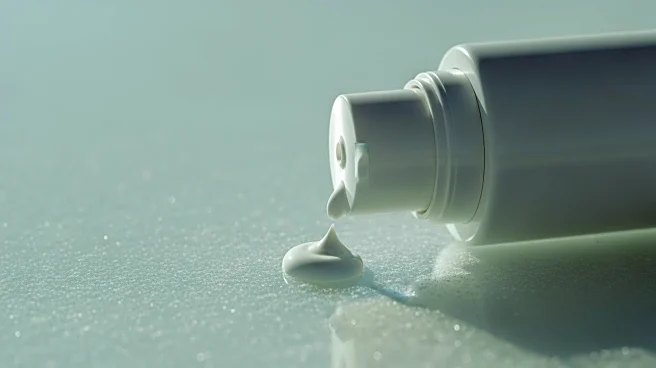What's Happening?
Travel often disrupts daily habits, particularly hydration routines, leading many to opt for single-use plastic water bottles. These bottles, however, are a significant source of microplastics, which are tiny
particles found in bottled water, tap systems, and food. Research indicates that bottled water contains far higher concentrations of microplastics than tap water. To address this issue, experts recommend using reusable water bottles made from stainless steel or glass, which are safer alternatives. These bottles not only help reduce microplastic intake but also contribute to sustainability efforts. Various brands offer options with features like double-wall vacuum insulation and built-in filters to ensure safe hydration during travel.
Why It's Important?
The prevalence of microplastics in bottled water poses health risks, as these particles can enter the body and potentially cause harm. By choosing reusable water bottles, travelers can significantly reduce their exposure to microplastics. This shift not only benefits individual health but also supports environmental sustainability by decreasing reliance on single-use plastics. The travel industry, which often sees high consumption of bottled water, can play a crucial role in promoting eco-friendly practices. As awareness grows, consumers are likely to demand safer and more sustainable hydration solutions, influencing market trends and product offerings.
What's Next?
As travelers become more conscious of the health and environmental impacts of microplastics, the demand for reusable water bottles is expected to rise. Brands may continue to innovate, offering advanced filtration systems and sustainable materials to cater to this growing market. Additionally, travel companies and airports might implement initiatives to encourage the use of reusable bottles, such as providing refill stations. This could lead to broader changes in consumer behavior and industry standards, promoting a shift towards more sustainable travel practices.
Beyond the Headlines
The issue of microplastics extends beyond individual health concerns, touching on broader environmental and ethical dimensions. The production and disposal of single-use plastics contribute significantly to pollution and resource depletion. By opting for reusable bottles, consumers can help mitigate these impacts, supporting global efforts to reduce plastic waste. This movement also aligns with ethical considerations, as it promotes responsible consumption and stewardship of natural resources. Long-term, widespread adoption of reusable bottles could lead to significant reductions in plastic pollution, benefiting ecosystems and communities worldwide.









